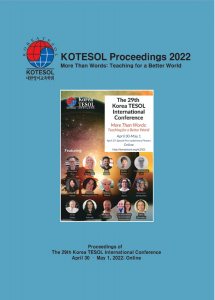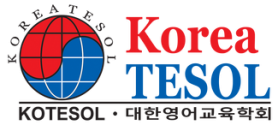KOTESOL Proceedings 2022

More Than Words: Teaching for a Better World
Proceedings of the 29th Korea TESOL International Conference – 2022
— CONTENTS —
.
Invited Speaker Article
The Power of Collaboration: Building Networks, Connecting Educators (p. 3)
— Grazzia Ma. Mendoza
Research Papers
Utilizing Online Exchanges to Enhance Experiential Learning and Intercultural Competence (9)
— Gordon Carlson, Daniel Markarian, and Steven Hecht
Does TESOL Teacher Motivation Matter? Values vs. Rewards (21)
— Bradford J. Lee, James Broadbridge, Hyunsuk Park, Miori Shimada, and Randi F. Freeman
Modern Art in the Language Classroom: Cultivating Interests, Building Confidence (35)
— William Tiley
Fulfilling a Dream: Two South Korean Students in Japan (49)
— Natasha Hashimoto
Teaching Online: How Has the New Zealand Experience Matched International Experiences? (57)
— Tim Edwards
Emotional Presence in EFL Students’ Virtual Study Abroad Experiences (67)
— Yanning Dong and Aika Ishige
Reviewing Narrow Reading for Incorporating Informal Learning into Classrooms (77)
— Hsiu Pin Cheng
Comparing Lexical and Grammatical Complexity Using Online Chat and Forum in the EFL Context (91)
— Tomotaka Shiroyama
Investigating the Roles of Homophones in Airline Safety (101)
— Ryouma Ishikawa and Daniel Dusza
Student Beliefs: Teacher Role in Decreasing Anxiety in the Language Learning Classroom (113)
— Miriam Vasquez and Lidija Elliott
Exploring Flipped Learning Through Preservice Teachers’ Experiences and Perceptions (127)
— Eunjeong Park
Multilingual Learners: The Importance of the Right Terminology (135)
— Keirah Comstock
Effects of VR and Online Public Speaking Lessons on Students’ Speaking Skills (141)
— Yukie Saito
Action Research Papers
Business English Case Studies for Social Responsibility and Sustainable Development (155)
— Travis H. Past
Teaching EFL Listening and Speaking Skills Using Service Learning (165)
— Monaliza H. Mamac and Titmonyneat Chalk
Techniques and Approaches
An Ecolinguistics Approach to Education (185)
— Jason D. Gold
Dictation in the L2 Classroom (197)
— Joshua Cohen
Diversity in Learner Negotiation of L1 Identity: Implications for Korean ELT Praxis (211)
— Kara Mac Donald and Sun Young Park
Don’t Simply Write Your Opinion – Show a Critical Analysis (225)
— John Breckenfeld
Making Friends with Machine Translation in the EFL Classroom (233)
— Kio Iwai and Joel P. Ryan
Autoethnographic Exploration as “a Missionary of L2 Pragmatics” (245)
— Sanae Oda-Sheehan
Machine Translation: Friend or Foe? (257)
— Rachelle R. Meilleur
Final Assessment Items for TOEIC in the Remote Learning Context (269)
— Nathan P. Krug
CALL After COVID: Asynchronous e-Learning in Higher Education (283)
— David P. McCurrach
The Power of Obsidian: A Digital Approach to Note-Taking (293)
— Michael Walker
The L2 Motivational Self System in English Writing Through the Process Writing Approach (305)
— Ei Phyoe Maung
The Use of Instagram to Enhance EFL Learners’ Speaking Skills (315)
— Asiya Tabassum
A Comparative Study of EFL MOOCs in Chinese Higher Education Institutions (325)
— Linlin Liu and Wenjuan Guan
Workshop Reports
ClassDojo as a Neurodiversity-Friendly, Adaptable Learning Management System (339)
— Meagan Renee Kaiser
Selecting, Grading, and Using TED Talks in Listening Lessons (347)
— Naheen Madarbakus-Ring
Engaging EFL Learners Through the Game of Go (359)
— Daniela Trinks
Online Flipped Learning Approach for Improved Communication, Collaboration, and Engagement (365)
— Marina Goto and Daniel Dusza
Conference Overview
Presenters and Presentations at the 29th Korea TESOL International Conference (373)
ㅡ Dr. David Shaffer, Editor



